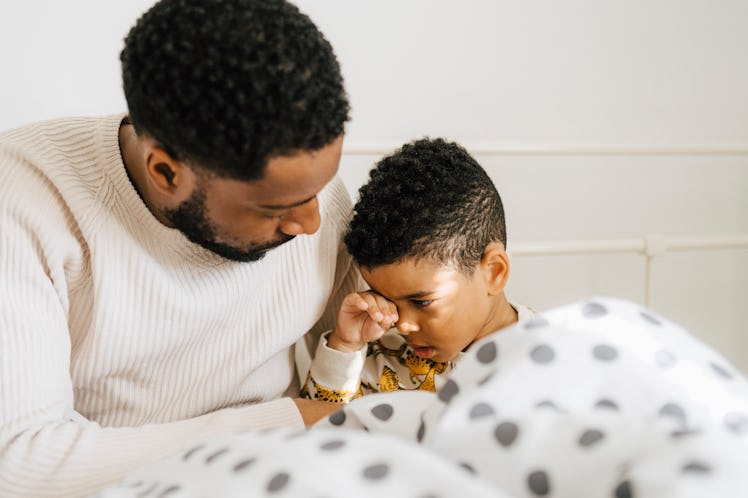7 Bedtime Rituals For Kids That Really Work
An effective sleep routine for toddlers and kids starts with fun, relaxing bedtime rituals. Here's where to start.

Too many parents dread the pre-bed hour. That’s when your sweet, agreeable youngster goes from a bundle of joy to holy terror, and you spend the better part of 60 minutes cajoling, begging, and admonishing then to climb in bed — and stay there. It doesn’t have to be this way. While the advent of technology and long work days has diminished traditional family time, you can still find ways to create a meaningful bedtime ritual that will help your child prepare for the night ahead, says Jennifer Waldburger, co-creator of Sleepy Planet Parenting and co-author of The Sleepeasy Solution.
The following activities “help kids focus their energy, slow down their minds, and get their bodies to relax,” says Waldburger. For the best results, organize the evening with 20 minutes of family time (playing games or just hanging out), followed by bath time, then at least 20 minutes up to an hour of wind-down time. With any luck, your new bedtime rituals will have your child sleeping like, well, a baby.
Turn Off All Electronics
TV, iPads, phones — all these devices stimulate when what you’re trying to do is help your kid unwind. “It’s one of the most common pitfalls for parents,” says Waldburger. “Even though some devices are now available without the blue light, which is known to stimulate the brain, the devices themselves still have the opposite effect of what you’re looking for.”
Have True Connect Time
Sitting side by side watching TV with your child may feel like a bonding activity, but there’s no parent-child interaction going on, Waldburger says. “If your child doesn’t feel like she’s getting a genuine fill-up of connecting time with her parent, she’s going to be the one seeking you out in the middle of the night.” Instead of TV, try quietly playing with blocks or stuffed animals on the floor together. Invent stories and exchange ideas.
Practice Saying Goodnight
Kids find it soothing to know that the world around them is going to sleep when they do. Sit quietly with you child on their bed, and say goodnight to various things in their room. After saying goodnight to their car poster, the clock, toy train, and the stuffed animals, it’s time to say goodnight to each other, too.
Teach Belly Breathing
This yoga-inspired bedtime ritual has been practiced by cultures around the world for centuries. Your child can benefit from it too, says Waldburger. “Start by having your child lie on her back in bed, and place a light book or stuffed animal on her stomach,” she suggests. “Tell your child to try and gently make the toy rise and fall by inhaling and exhaling deeply, inflating her stomach with air each time.” The exercise relaxes the muscles, and helps a child get focused and feel calm.
Learn Hot Chocolate Breathing
In a similar exercise, tell your little one to cup their hands as if they are holding a big mug of hot cocoa. Tell them to imagine breathing in deeply to inhale the drink’s aroma, then exhale deeply as if they are blowing over the top too cool the drink off. Again, this activity takes a child’s mind off the millions of distractions around him, and helps them channel their attention to the here and now.
Greet The Moon
This time-honored yoga pose can help kids stretch it out before bed, allowing them to relax more easily. Standing tall, reach up to the ceiling together and breathe deeply. Then, exhale and let your body and arms swing to touch the floor. Repeat several times.
Try The Scrunch-And-Release
Lying comfortably on their bed, your child should scrunch up (tighten) different areas of their body, then let out a big exhale and release them — a practice technically called progressive muscle relaxation. Start with the head and neck muscles, and work your way down to the toes, until the whole body has tensed and relaxed.
This article was originally published on